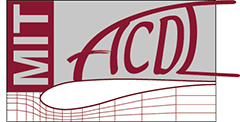Abstract: This talk will present a data-driven approach for calculating adjoint sensitivities in unsteady turbulent flows, with application to shape optimization and output-based adaptation. The approach does not use unsteady adjoint equations, which are expensive to solve and become unstable for chaotic problems, but instead relies on unsteady data to train a corrected turbulence model, through a dynamic closure, which then yields the required adjoint solutions. It is non-intrusive and inexpensive, requiring only a small number of unsteady forward simulations, but sufficiently powerful to capture unsteady effects in the sensitivities. Results for high-order discretizations of the unsteady Navier-Stokes equations augmented by a corrected Spalart-Allmaras turbulence model demonstrate the ability of the approach in driving airfoil shape optimization and in adapting unsteady flowfields to target statistical outputs of interest.
Bio: Krzysztof J. Fidkowski is a Professor of Aerospace Engineering at the University of Michigan. Prof. Fidkowski earned his S.B. in Physics and S.B., S.M, and Ph.D. degrees in Aeronautics and Astronautics from MIT. Before joining the University of Michigan in 2008 as an assistant professor, he was a post-doctoral associate at the Aerospace Computational Design Laboratory at MIT. He previously served as chair of the CFD Subcommittee of the AIAA Fluid Dynamics Technical Committee, organized fluids and CFD tracks at multiple AIAA conferences, and is an AIAA Associate Fellow. His primary research field is in algorithmic development for computational fluid dynamics, specifically in the use of adjoint methods for numerical error estimation, mesh adaptation, and uncertainty quantification.

